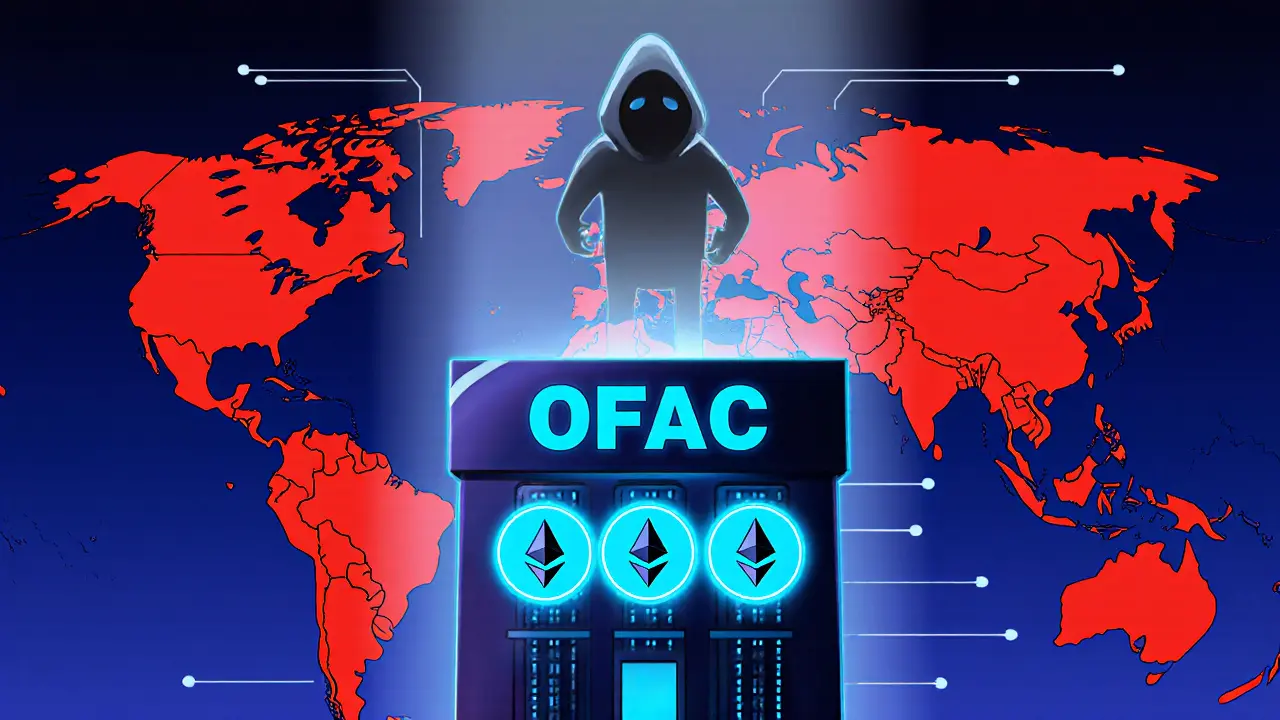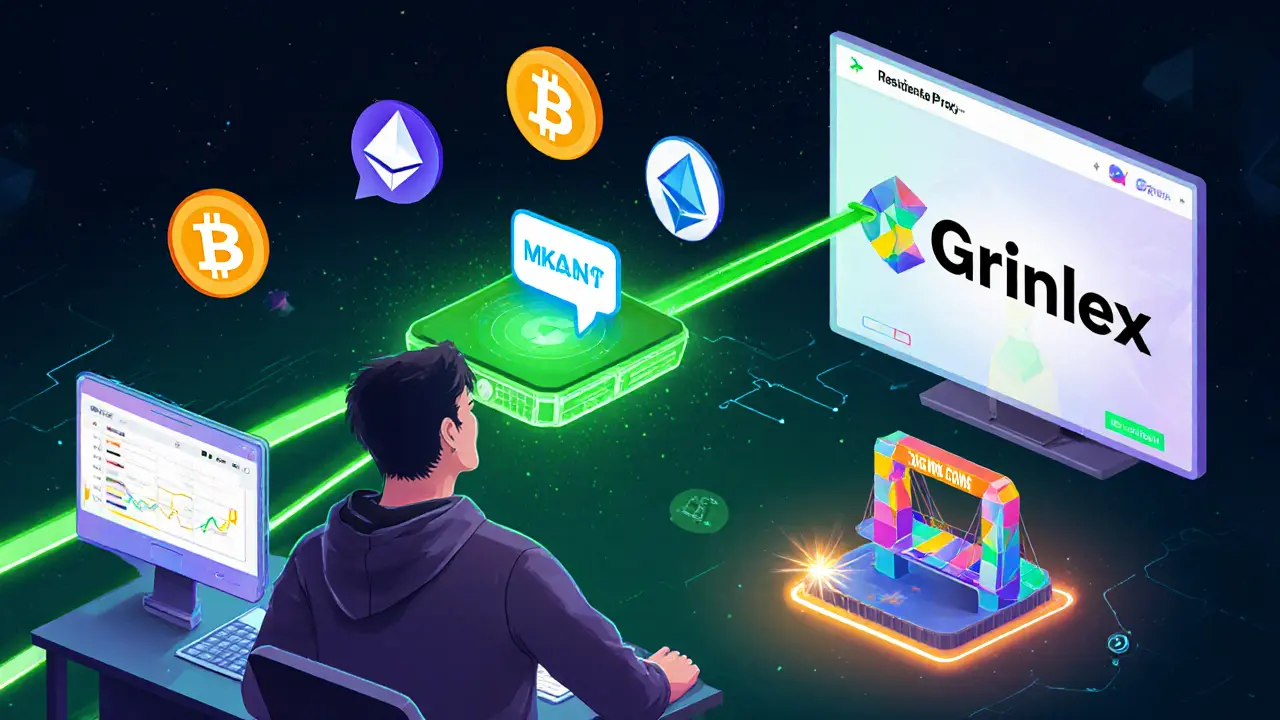
Evasion Method Comparison Tool
Understanding Evasion Options
This tool compares key evasion methods used by citizens in sanctioned countries to access cryptocurrency services. Use the filters below to see which methods best fit your needs.
| Method | Typical Cost (USD) | Detection Risk | Key Features |
|---|---|---|---|
| VPN / Residential Proxy | 10-30 per month | Low | IP masking, easy setup |
| Successor Exchange | 0-5 trading fee | Medium | Rebranded platforms, may have KYC |
| DeFi Swap (Polygon → DAI) | 0.3% gas + 0.1% swap fee | Low | Chain analytics needed to trace |
| Telegram Bot Exchange | Variable, often higher spreads | High | Minimal KYC, increasing monitoring |
Key considerations
- For low-risk operations: Consider VPN/proxy services or DeFi swaps
- For quick transactions: Successor exchanges offer lower fees
- For maximum privacy: DeFi protocols with layer-2 solutions
- For users in high-risk jurisdictions: Monitor OFAC's SDN list regularly
Remember: No method guarantees 100% security against evolving sanctions enforcement.
Sanctioned crypto exchanges are platforms that operate despite being listed on the U.S. Office of Foreign Assets Control (OFAC) Specially Designated Nationals (SDN) list. They enable users in countries under international sanctions to trade, convert, and move digital assets. While governments tighten crypto sanctions, citizens in those jurisdictions constantly innovate to stay connected to the global market.
What drives the crackdown?
Since 2018, OFAC has expanded its reach, adding 57 individuals and entities for crypto‑related violations in 2025 alone. The agency’s annual growth rate for crypto sanctions sits at 18%, and crypto‑linked designations made up 23% of all new sanctions in 2024. The most targeted nation remains North Korea (38% of OFAC actions), followed by Russia and Iran. Each sanction aims to cut off the flow of illicit funds, but the decentralized nature of blockchains makes enforcement a cat‑and‑mouse game.
Office of Foreign Assets Control (OFAC) is the U.S. Treasury bureau that administers and enforces economic sanctions, including those against crypto wallets and exchanges. Its SDN list now contains over 1,200 crypto‑wallet addresses, highlighting the scale of monitored activity.
Which digital assets dominate sanctioned transactions?
Data from blockchain analytics firms shows a clear hierarchy:
- Bitcoin (BTC) accounts for roughly 65% of identified transactions linked to sanctioned entities.
- Ethereum (ETH) makes up about 18%.
- Stablecoins, especially USDT and DAI, represent 12% of the flow.
The preference for Bitcoin stems from its deep liquidity and relative anonymity, while Ethereum’s smart‑contract capabilities power more complex evasion tools, such as decentralized mixers.
Core evasion tactics
Sanctioned‑country users adopt a toolbox of methods to slip past OFAC filters. Below is a quick cheat‑sheet:
- VPNs and residential proxies - Mask IP addresses to appear as if accessing from a jurisdiction without sanctions.
- Cross‑border payment processors - Platforms like Exved facilitate dual‑use goods imports and also route crypto payments.
- Successor exchanges - When a primary exchange is seized, operators launch a rebranded platform (e.g., Garantex → a Russian exchange sanctioned in 2022 gave way to Grinex after the 2025 domain seizure.
- Decentralized Finance (DeFi) protocols - Users swap to assets on chains that are harder to block, such as moving USDT into DAI on the Polygon network.
- Telegram‑based platforms - Services like MKAN Coin operate from Dubai and mimic the UI of traditional exchanges.
Case study: Iran’s Tether freeze and rapid migration
On July 2, 2025, Tether executed its largest‑ever freeze, locking 42 crypto addresses tied to Iranian exchange Nobitex. The move shocked local traders, but within hours they were swapping frozen USDT into DAI via the Polygon network, preserving liquidity while sidestepping the freeze.
The Iranian government’s response was swift - a new “Law on Taxation of Speculation and Profiteering” imposed capital‑gains tax on crypto trades, mirroring traditional asset regimes. Yet TRM Labs reported only an 11% dip in crypto inflows during the first half of 2025, underscating the resilience of these workarounds.

Case study: ShapeShift’s 0,000 penalty
Swiss‑based ShapeShift paid a $750,000 settlement in 2025 after OFAC found the platform allowed users from Cuba, Iran, Sudan, and Syria to transact without a sanctions‑compliance program. The incident highlighted a systemic gap: many exchanges lack robust KYC/AML checks, inadvertently opening doors for sanctioned users.
Case study: Garantex’s transformation into a decentralized laundering hub
When U.S. and European law‑enforcement agencies seized Garantex’s domain and froze $26 million on March 6, 2025, the exchange didn’t disappear. Instead, it migrated operations to Grinex and partnered with services like Exved and MKAN Coin, creating a semi‑decentralized network that processes cross‑border payments while evading direct jurisdictional control.
Why some jurisdictions unintentionally help
Crypto‑friendly countries provide a safe harbour for sanctioned users seeking to move assets:
- Singapore imposes no capital‑gains tax and enforces strong AML standards, attracting sophisticated traders.
- El Salvador made Bitcoin legal tender with a 0% tax on foreign crypto income.
- Dubai (UAE) offers tax‑free personal crypto income under the VARA authority.
- European micro‑states such as Malta, Estonia, and Slovenia provide regulatory sandboxes that lower entry barriers for new services.

Comparison of common evasion methods
| Method | Typical Cost (USD) | Detection Risk |
|---|---|---|
| VPN / Residential Proxy | 10‑30 per month | Low - depends on IP reputation |
| Successor Exchange (e.g., Grinex) | 0‑5 trading fee | Medium - exchange may be flagged soon |
| DeFi Swap (Polygon → DAI) | 0.3% gas + 0.1% swap fee | Low - chain analytics needed to trace |
| Telegram Bot Exchange (MKAN Coin) | Variable, often higher spreads | High - KYC often absent, but monitoring increasing |
Practical checklist for users in sanctioned regions
- Use a reputable VPN that rotates IPs daily.
- Prefer decentralized bridges (e.g., Polygon, Binance Smart Chain) over centralized exchanges.
- Store assets in non‑custodial wallets; avoid hot wallets tied to flagged exchanges.
- Regularly monitor OFAC’s SDN list for newly sanctioned wallet addresses.
- Consider mixing services with proven track records, but be aware they’re under heightened scrutiny (e.g., Tornado Cash‑style protocols).
Future outlook: The arms race continues
Enforcement is accelerating. In January 2025, OFAC sanctioned a DeFi protocol for the first time, freezing $150 million. Mixers faced five major actions in 2024 alone. Yet users are already exploring privacy‑enhancing rollups, zero‑knowledge proofs, and cross‑chain atomic swaps to stay ahead.
The annual 18% rise in crypto sanctions suggests governments won’t back off, but the technology’s rapid evolution means a total shutdown is unlikely. Expect more “successor” platforms, deeper integration of privacy layers, and continued reliance on crypto‑friendly jurisdictions.
Key takeaways
- OFAC’s crackdown is intense, but Bitcoin, Ethereum, and stablecoins keep flowing.
- Successor exchanges, VPNs, and DeFi bridges are the main lifelines for sanctioned users.
- Tax‑friendly hubs like Singapore, Dubai, and El Salvador act as indirect gateways.
- Staying under the radar requires constant monitoring of sanctions lists and quick migration to new tools.
Can I legally use a VPN to access a crypto exchange from a sanctioned country?
Using a VPN itself isn’t illegal in most jurisdictions, but if you trade on a platform that’s prohibited for your nationality, you could still breach sanctions. The risk lies in the transaction, not the VPN.
What’s the difference between a successor exchange and a decentralized exchange?
A successor exchange is a rebranded version of a seized platform, often still running a centralized order‑book and KYC (or lack thereof). A decentralized exchange (DEX) operates on smart contracts without a controlling entity, making it harder to shut down.
How effective are OFAC’s crypto wallet sanctions in practice?
Wallet bans disrupt large‑scale laundering but can be bypassed with address hopping, mixers, and new wallet creation. Enforcement data shows $6.9 billion in illicit crypto moved over 24 months despite sanctions.
Is swapping USDT to DAI on Polygon safe from future freezes?
Polygon’s layer‑2 network offers lower visibility, but any token can become a target if regulators decide to sanction the smart‑contract address. Diversifying across multiple chains reduces risk.
What are the signs that an exchange might be a successor of a sanctioned platform?
Look for sudden domain changes, identical UI/UX, the same customer support emails, or a migration notice referencing a “new platform”. Often the old brand’s staff appear in the new team.


Comments
Lindsey Bird
Seriously? This post reads like a Hollywood thriller where everyone thinks they're a cyber‑ninja. The drama is real, but the reality? Just a bunch of VPN‑hopping users trying to stay one step ahead.
john price
People act like OFAC is some kind of omnipotent overlord, but the truth is you can dodge most bans if you know the right tricks. The sanctions only work if you actually enforce them, and honestly, most of them are just paper tigers.
Ty Hoffer Houston
The landscape of crypto evasion in sanctioned regions is both fascinating and concerning. On one hand, the ingenuity displayed by users shows how adaptable decentralized technology can be. On the other hand, it highlights gaps in international regulatory cooperation that can be exploited. Many of the methods described, such as VPN usage and successor exchanges, are low‑cost and accessible to almost anyone with an internet connection. This low barrier to entry means that even small traders can participate in global markets despite official bans. The reliance on Bitcoin and Ethereum makes sense given their liquidity, but it also concentrates risk on a few major chains. When regulators target a specific token, the network effect can cause rapid shifts to alternatives like Polygon or Binance Smart Chain. Decentralized finance protocols add another layer of complexity, allowing users to swap assets without a central authority. However, DeFi mixers and bridges are not invisible; blockchain analytics firms are getting better at tracing flows across chains. The case studies on Iran and ShapeShift illustrate how quickly the community can pivot when a freeze occurs. Within hours of a freeze, most users have already migrated to a new platform or swapped to a different stablecoin. This resilience suggests that outright bans may only cause temporary inconvenience rather than a permanent shutdown. Yet, the ethical implications cannot be ignored, as these workarounds can also facilitate illicit financing. Countries that provide tax‑friendly environments, like Singapore or Dubai, unintentionally become safe harbors for sanctioned actors. Ultimately, the cat‑and‑mouse game will continue until either technology advances beyond regulatory reach or governments devise more coordinated enforcement strategies.
Isabelle Filion
Ah, the classic tale of sanctioned actors and their ever‑creative workarounds. One would suppose the mere existence of VPNs would be an unprecedented challenge for any regulator-how utterly novel. Yet, here we are, enumerating a list of “innovations” that have been known for years. The post reads like a checklist for the ethically challenged.
Jessica Pence
If you're looking for a quick way to stay under the radar, start with a reputable VPN that rotates your IP daily. Next, consider moving your funds to a non‑custodial wallet and using a DeFi bridge like Polygon to swap stablecoins. Also, keep an eye on the OFAC SDN list-new addresses get added all the time, and you don’t want to get caught off‑guard.
johnny garcia
Indeed, the perception of OFAC as an omnipotent force is more myth than fact. While the sanctions are technically enforceable, their practical impact hinges on the willingness of exchanges to comply, which varies widely. 🧐 Moreover, the cryptographic nature of blockchain means that once a transaction is recorded, it’s nearly impossible to retroactively alter without consensus. 😏
Andrew Smith
Sounds like you're right on point-there's so much room for optimism when we see communities adapt so quickly. Even if the tools are low‑cost, the collective knowledge sharing makes the whole ecosystem more resilient. Keep the good vibes coming, and maybe we’ll see more open‑source solutions that help legit users stay compliant.
Ryan Comers
Oh, please! Everyone loves a good thriller, but the reality is this is just a bunch of tech‑savvy people doing what they need to survive. 🌐 The “Hollywood” vibe is overblown, and the drama? It's just everyday crypto hustle. 🙄
Tom Glynn
You've nailed it-once the blockchain records are immutable, the only real leverage is on‑ramps and off‑ramps. That's why many users now favor decentralized bridges; they sidestep the traditional points of failure. Keep those insights coming, it's what the community needs.
Johanna Hegewald
Exactly, the community’s quick moves keep the market fluid. Using non‑custodial wallets and DeFi bridges really does the trick. Simple steps, big impact.
Benjamin Debrick
Indeed; the dramatization of routine crypto operations seems unnecessary; however, one must acknowledge the underlying vigilance required; the perpetual cat‑and‑mouse dynamics warrant a measured, perhaps even scholarly, observation.
Anna Kammerer
Wow, another deep dive into how people “outsmart” sanctions-groundbreaking stuff. The list of evasion tactics reads like a startup pitch deck for the underworld. Honestly, if I wanted to gamble with my money, I’d just buy a lottery ticket instead of navigating this maze.
Stephen Rees
It’s interesting how quickly these methods proliferate, almost as if there’s a shadow network guiding the flow. Some might say the real power isn’t in the tech but in the unseen hands that push users toward these platforms. Still, it feels like we’re just looking at the surface.
Katheline Coleman
Indeed, the phenomenology of sanctioned actors adopting decentralized mechanisms invites a rigorous examination of sovereign authority versus transnational digital agency. One must consider the juridical implications of cross‑border crypto transactions in the context of extraterritorial sanctions regimes.
Amy Kember
So the bottom line is regulators can’t keep up with the speed of innovation. If they want to be effective they need global cooperation and real tech solutions.
Scott McCalman
Great read, nothing new here.